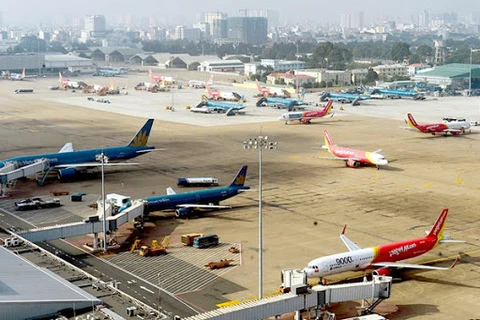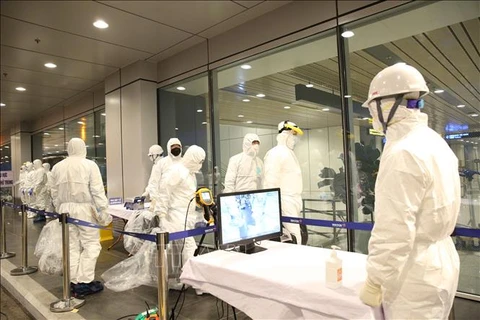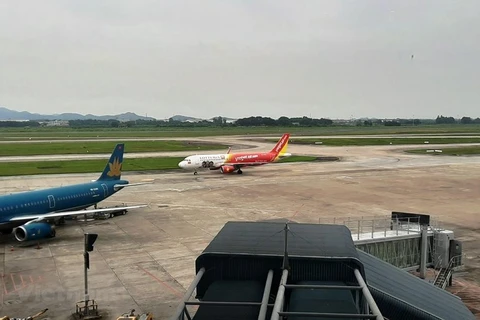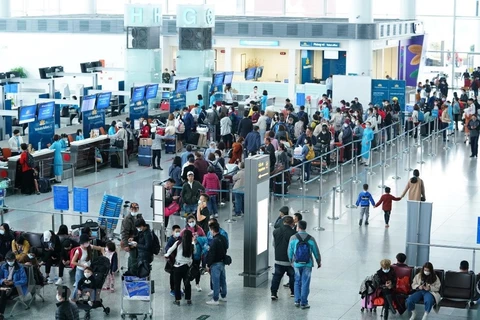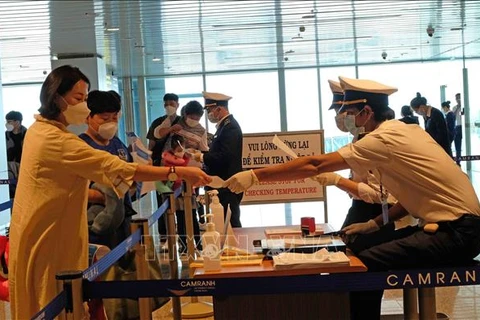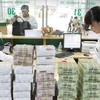Hanoi (VNA) – Airlines in Vietnam are looking at ways to overcome the impact of the COVID-19 outbreak after seeing declining passenger numbers.
Double-digit declines
The Civil Aviation Authority of Vietnam (CAAV) reported that airports in the country served nearly 8.1 million passengers in February, down 11.6 percent from the same period last year. They included 2.4 million foreigners and 5.7 million domestic passengers, down 29.8 percent and 0.7 percent, respectively
Also last month, Vietnamese airlines transported 3.7 million passengers, falling 13.7 percent year on year. The number of foreign and domestic passengers respectively decreased 39.5 percent and 0.7 percent.
The CAAV attributed the double-digit fall in the Vietnamese aviation market after many years of strong growth to the direct impact of the COVID-19 outbreak.
Vietnam Airlines said for every week of the epidemic, the national flag carrier is losing 200 – 250 billion VND (8.7 – 10.8 million USD). Its revenue from both passenger and cargo transportation dropped 20 – 25 percent in the first half of February.
According to the CAAV, China, which has recorded the biggest number of COVID-19 cases, accounts for 26.1 percent of the passenger and cargo volume that domestic carriers transport to and from international destinations.
Before the acute respiratory disease broke out, 14 airlines were operating 72 routes between Vietnam and China. The suspension of flights to China has caused Vietnamese airlines to lose 400,000 passengers per month. They have also had to pay more for ticket exchanges, cancellations, and sterilisation, the authority said.
In a report assessing the outbreak’s impact on the economy, Dr Can Van Luc and analysts from the BIDV Training and Research Institute said air transport will be hit the hardest since foreign passengers using Vietnam’s air transport services account for more than 79 percent of total international arrivals in the country. In particular, Chinese visitors arriving by air make up 70 percent of all Chinese visitors to Vietnam.
The research division at SSI Securities JSC also rated the aviation sector’s short-term outlook as “negative”, noting that all airlines could be influenced by the epidemic due to lower travel demand, especially from China. In 2019, Chinese tourists accounted for 32.2 percent of the 18 million foreign travellers to Vietnam.
Seeking solutions
Since late February, carriers like Vietnam Airlines, Vietjet Air, Jetstar Pacific and Bamboo Airways have been offering discounts on domestic and international routes.
Notably, people now can easily buy tickets for Hanoi – Ho Chi Minh City flights for only one-third of train tickets. They can also buy cheaper tickets on international routes.
Economic experts said the airlines made the move with a view to attracting passengers, stimulating travel demand and maintaining their operations.
Lai Xuan Thanh, Chairman of the Board of Directors of the Airports Corporation of Vietnam (ACV), said the ACV will need to adjust its business plan and work with airlines to seek ways to stimulate demand.
After the SARS outbreak in 2003, the aviation sector learned that overdependence on a single market had a considerable influence on airlines if that market encountered problems. Therefore, the sector has worked to restructure its markets.
Facing the COVID-19 outbreak, the ACV is also coordinating with relevant parties to carry out restructuring, Thanh added.
Vietnam Airlines has announced that it is offering its narrow-body aircraft (A321) and wide-body ones (A350-900 and B787-9/10) for lease.
Meanwhile, Vietjet Air is launching five direct routes from Da Nang, Hanoi and HCM City to India.
Airlines are working to open new domestic routes, sell tickets at lower prices to attract passengers, while ensuring their planes do not stand idle to reduce expenses, the CAAV said.
It has recommended carriers negotiate with aircraft renters to return some planes and with manufacturers to extend deadlines for receiving new planes.
Airlines have also submitted reports to the CAAV, the Ministry of Transport and the Government so that detailed plans can be made to help revive the market in late 2020 and the next two years after the outbreak is contained./.
VNA

